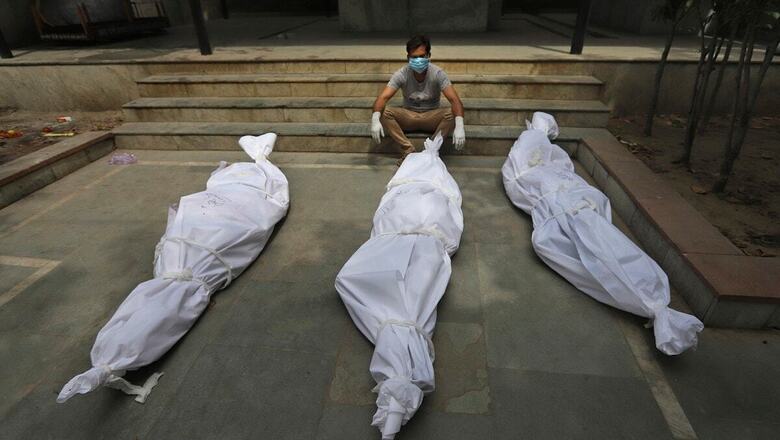
views
Thiruvananthapuram: Criticised for its count of COVID-19 deaths amid allegations of under-reporting, the Kerala government has decided to replace its existing procedures of Covid related deaths.
The COVID-19 deaths are currently finalised by a state-level death audit committee. Hereafter, the deaths would be ascertained by 14 district-level committees. Chief Minister Pinarayi Vijayan has directed that doctors should prepare criteria to determine the real cause of death.
Has There Been an Attempt to Cover up Covid Deaths?
Kerala reported 9, 510 deaths during a period of 492 days between January 30, 2020 (the first active case reported) and June 4, 2021, due to COVID-19. It is 0.37 per cent of the total cases. Of this, 28.98 per cent (2,756) were reported in a single month, May 2021. The first death was reported on March 28, 2020.
As of June 4, the Thiruvananthapuram district, with 1953 deaths, reported the maximum number and Idukki, with 79 deaths, reported the least number.
Age Group of the Deceased Patients (Source: GoK Dashboard)
0 to 17: 15 deaths
18 to 40: 385 deaths
41 to 59: 2.173 deaths
60-plus: 6,937 deaths
The state, now in fourth place in the number of active patients, had a rethinking mainly after the opposition’s allegations. On May 28, Leader of opposition VD Satheesan raised concerns over the death toll declared by the state government. He stated that many, including members of doctors’ associations, have raised similar complaints about under-reporting the toll in the state.
On July 2, while moving notice to discuss the COVID situation in the state assembly as an adjournment motion, Muslim League leader Dr M K Muneer, a Medical doctor by profession, said there has been an attempt to cover up COVID deaths in the state. “It is not right to project Kerala as the leader in COVID containment measures as it is not showing the actual numbers of deaths,” he said.
Replying to the allegation that the state government did not present the actual COVID deaths, Health Minister Veena George termed it as ‘baseless’. “There are World Health Organisation (WHO) guidelines to confirm the COVID deaths and each death is being confirmed based on it. The highest number of COVID deaths was recorded in the age group of 70-80. But the government was so far maintained that the cause of deaths was being ascertained on the basis of WHO norms,” she said.
The Methodology
Responding to the charges of the Opposition, the health minister pointed out that “a person who died after a jackfruit fell on his head had tested positive at the hospital could not be considered a COVID death’.
She was apparently referring to the case of a 42-year-old autorickshaw driver from Belur in Kasaragod. In May 2020, he was admitted for surgery to a hospital after being hit on the head by a falling jackfruit and ended up testing COVID positive.
Satheesan was quick to retort by the example of 42-year-old CPM leader P. Biju, who died of cardiac arrest in a hospital a few days after he tested negative last year. “He did not die after a jackfruit fell on him,” he said.
Expressing serious reservations about the methodology selected for determining COVID deaths, the opposition leader said many who had died of complications like bleeding in the brain, cardiac arrest and stroke after turning negative were not registered as COVID deaths. “Even when people die of Black Fungus, it is not recorded as a COVID death, ” Satheesan said.
He also compared the figures in two districts, Thiruvananthapuram and Malappuram, to make his point. “Thiruvananthapuram has 1.25 lakh cases while Malappuram 1.41 lakh cases, an excess of over 18,000 cases. But the deaths in Thiruvananthapuram (585) is five times more than in Malappuram (114),’ Satheesan said.
The opposition leader pointed out that the death protocol followed by Kerala violates ICMR guidelines.
More Than a Number Game
Many months before it turned into a heated discussion in the state assembly, this topic was under examination of several medical doctors who became suspicious about the number of deaths reported. “I developed a doubt on July 21, 2020, as the Government of Kerala dashboard on COVID-19 changed its style of reporting the deaths. Later, I learnt that at least six deaths in my area were not recorded. Hence I started searching the obituary columns in newspapers to find any difference in the number,” Dr Arun NM, who practices general medicine in Palakkad, told News18.com.
Then, Dr Arun, along with the support of a few friends started compiling deaths due to COVID-19, independently. “We have compiled the list from daily news reports across all media, on a daily basis. It was a tedious time-consuming exercise. We checked the obit columns of all the main newspapers and the result was startling and our doubts were true. This practice went on till December second week. Then the Panchayat elections came and the newspapers reduced the number of obituaries,” he said.
They found a mismatch within the government figures as well. For example, the health department’s figures showed that there were 34 deaths as of July 31 in Thiruvananthapuram, but the government’s figure stands at 22. This meant between July 31 and August 13, according to the government, only two more people died in the state capital.
Did the Government Get it Wrong?
Here’s what the World Health Organization (WHO) says: “A death due to COVID-19 is defined for surveillance purposes as a death resulting from a clinically compatible illness, in a probable or confirmed COVID-19 case, unless there is a clear alternative cause of death that cannot be related to COVID disease (e.g trauma). There should be no period of complete recovery from COVID-19 between illness and death.”
On April 16, 2020 it said, “A death due to COVID-19 may not be attributed to another disease (e.g. cancer) and should be counted independently of preexisting conditions that are suspected of triggering a severe course of COVID-19.”
“Unlike many medical conditions, a COVID-19 death is not a straightforward process. It is not like deciding between ‘pregnant and non-pregnant. It is easy to under-count (a frequent complaint), and also over-count,” said Dr. Rajeev Jayadevan, scientific advisor to Indian Medical Association
“Let’s take a look at definitions of WHO, ICMR and Public Health England. WHO’s the definition of COVID-19 death was written on 16 April 2020, at a time when the complete picture of COVID-19 was not known. We now know that it is much more than a viral illness; delayed deaths occur. These delayed deaths may follow a period of apparent clinical recovery, that is when the patient feels better. The ongoing immune process inside the body could last for weeks when vascular events such as stroke, heart attacks and pulmonary emboli have been well-described. In other words, the WHO’s definition almost (indirectly) implies that a COVID-19 death must necessarily occur during the initial phase of COVID-19. This definition fails to acknowledge that multiple lethal complications could occur after a period of apparent improvement,’ explained Dr. Rajeev.
“By saying, ‘There should be no period of complete recovery from COVID-19 between illness and death’, we could be missing deaths due to vascular events, which in fact were due to the (largely silent) immune process that was ongoing: not everyone gets lab tests after discharge,” he added.
According to him, Public Health England on the other hand, realised they were initially “over-counting” deaths, and soon revised their definition to deaths less than 28 days. This reduced the death count by up to 25%. They have kept a second category too, based on a 60-day mark.
Welcoming the step taken by the Kerala government, Dr Rajeev said that it is natural to have such updates. “Let’s not be adamant. Old definitions will need to be updated to avoid excluding those who died as a result of the disease in the weeks following initial ‘recovery. Defining death in COVID-19 will remain a contentious matter. It is impossible to have a universally accepted definition as the health conditions differ in various countries.”
Has the Argument Gained Acceptance Now?
Though there were demands for at least six months from various quarters to review the methodology for defining a Covid death, it was not addressed properly. Recently, both the Union and state governments announced special relief packages for children orphaned by COVID-19.
The Union government’s welfare measures include a corpus of Rs 10 lakh whose interest they will receive as a stipend for five years and followed by the handing over of the principal when they turn 18, as well as administrative and financial support for their education.
The financial aid of the Kerala State includes a one-time transfer of Rs Three lakh and Rs 2,000 monthly aid till the child reaches 18 years of age. The government will also bear the responsibility of the child’s education till the Degree level. However, many children who lost their parents to Covid may be deprived of this assistance if there is any miss in the list of deaths due to covid.
“If someone dies due to a heart attack after testing negative for the coronavirus, it is not counted as death due to the pandemic. People who are dying due to post-COVID-19 complications are not added to the list. The government has declared a financial assistance scheme for children orphaned by the death of their parents in the pandemic. But if the government tries to reduce the death toll, deliberately, deserving families will not get assistance. We request the government to check this,” said Satheesan.
The move by the state government may also pave way for the review of all Covid-19 related deaths reported in Kerala over the period.
Read all the Latest News, Breaking News and Coronavirus News here.




















Comments
0 comment